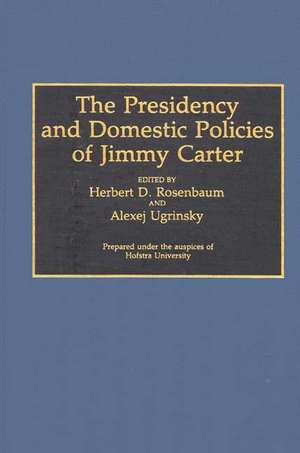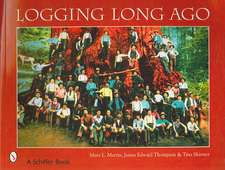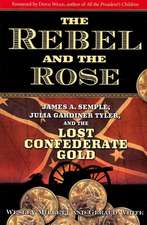The Presidency and Domestic Policies of Jimmy Carter: Contributions in Political Science
Editat de Herbert D. Rosenbaum, Alexej Ugrinskyen Limba Engleză Hardback – 29 oct 1993 – vârsta până la 17 ani
Din seria Contributions in Political Science
- 38%
 Preț: 438.51 lei
Preț: 438.51 lei - 27%
 Preț: 441.64 lei
Preț: 441.64 lei - 28%
 Preț: 436.80 lei
Preț: 436.80 lei - 38%
 Preț: 437.47 lei
Preț: 437.47 lei - 38%
 Preț: 345.58 lei
Preț: 345.58 lei - 24%
 Preț: 460.68 lei
Preț: 460.68 lei - 27%
 Preț: 444.08 lei
Preț: 444.08 lei - 38%
 Preț: 437.84 lei
Preț: 437.84 lei - 22%
 Preț: 231.81 lei
Preț: 231.81 lei - 38%
 Preț: 436.57 lei
Preț: 436.57 lei - 27%
 Preț: 346.07 lei
Preț: 346.07 lei - 27%
 Preț: 345.74 lei
Preț: 345.74 lei - 28%
 Preț: 436.99 lei
Preț: 436.99 lei - 38%
 Preț: 345.30 lei
Preț: 345.30 lei - 28%
 Preț: 437.91 lei
Preț: 437.91 lei - 23%
 Preț: 171.93 lei
Preț: 171.93 lei - 28%
 Preț: 344.63 lei
Preț: 344.63 lei - 27%
 Preț: 437.84 lei
Preț: 437.84 lei - 38%
 Preț: 438.41 lei
Preț: 438.41 lei - 23%
 Preț: 223.20 lei
Preț: 223.20 lei - 28%
 Preț: 437.57 lei
Preț: 437.57 lei - 38%
 Preț: 346.00 lei
Preț: 346.00 lei - 27%
 Preț: 346.50 lei
Preț: 346.50 lei - 28%
 Preț: 438.07 lei
Preț: 438.07 lei - 27%
 Preț: 439.09 lei
Preț: 439.09 lei - 38%
 Preț: 436.99 lei
Preț: 436.99 lei - 28%
 Preț: 435.65 lei
Preț: 435.65 lei - 38%
 Preț: 438.17 lei
Preț: 438.17 lei - 38%
 Preț: 346.25 lei
Preț: 346.25 lei - 23%
 Preț: 229.50 lei
Preț: 229.50 lei - 27%
 Preț: 440.79 lei
Preț: 440.79 lei - 38%
 Preț: 345.83 lei
Preț: 345.83 lei - 38%
 Preț: 438.00 lei
Preț: 438.00 lei - 28%
 Preț: 437.84 lei
Preț: 437.84 lei - 38%
 Preț: 436.99 lei
Preț: 436.99 lei - 27%
 Preț: 438.67 lei
Preț: 438.67 lei - 28%
 Preț: 438.07 lei
Preț: 438.07 lei - 11%
 Preț: 356.63 lei
Preț: 356.63 lei - 28%
 Preț: 438.00 lei
Preț: 438.00 lei - 32%
 Preț: 231.69 lei
Preț: 231.69 lei - 38%
 Preț: 438.41 lei
Preț: 438.41 lei - 28%
 Preț: 461.11 lei
Preț: 461.11 lei - 32%
 Preț: 231.89 lei
Preț: 231.89 lei - 19%
 Preț: 182.01 lei
Preț: 182.01 lei - 38%
 Preț: 436.47 lei
Preț: 436.47 lei - 38%
 Preț: 439.17 lei
Preț: 439.17 lei - 38%
 Preț: 437.07 lei
Preț: 437.07 lei
Preț: 453.79 lei
Preț vechi: 613.28 lei
-26% Nou
Puncte Express: 681
Preț estimativ în valută:
86.83€ • 90.67$ • 71.70£
86.83€ • 90.67$ • 71.70£
Carte tipărită la comandă
Livrare economică 15-29 aprilie
Preluare comenzi: 021 569.72.76
Specificații
ISBN-13: 9780313288456
ISBN-10: 0313288453
Pagini: 876
Dimensiuni: 156 x 235 x 46 mm
Greutate: 1.38 kg
Editura: Bloomsbury Publishing
Colecția Praeger
Seria Contributions in Political Science
Locul publicării:New York, United States
ISBN-10: 0313288453
Pagini: 876
Dimensiuni: 156 x 235 x 46 mm
Greutate: 1.38 kg
Editura: Bloomsbury Publishing
Colecția Praeger
Seria Contributions in Political Science
Locul publicării:New York, United States
Notă biografică
HERBERT D. ROSENBAUM recently retired from his position as Professor of History at Hofstra University. He was the Director of the Conference on the Presidency of Franklin D. Roosevelt in 1982, and was also the co-editor of the proceedings of that conference. He was Director of the Jimmy Carter Conference.ALEXEJ UGRINSKY is Director for Documentation, Finance, and Planning at the Hofstra Cultural Center. Both have served as editors for earlier volumes of the Hofstra Presidency Series published in conjunction with Greenwood Press.
Cuprins
The Carter Presidency: Two PerspectivesPresident Carter, the Democratic Party, and the Making of Domestic Policy by Stuart E. EizenstatThe Carter Presidency in Historical Perspective by Erwin C. HargroveThe Emergence and Character of Jimmy CarterThe New SouthJimmy Carter and the Sunbelt Report: Seeking a National Agenda by Edward D. BerkowitzJimmy Carter as Spokesman of Southern Liberalism by Donald CunnigenThe Role of ReligionAmerican Civil Religion and the Presidential Rhetoric of Jimmy Carter by Michael J. AdeeJimmy Carter Was a Baptist President by James A. SpeerThe Elections of 1976 and 1980Campaigner and President: Jimmy Carter's Campaign Promises and Presidential Performance by Michael G. KrukonesJimmy Carter and the Selling of the President, 1976-1980 by Leo P. RibuffoThe Institutional PresidencyConceptions of the PresidencyJimmy Carter and the Age of Limits: Presidential Power in a Time of Decline and Diffusion by Michael A. GenoveseLegitimacy and Presidential Power: A Constitutional Analysis of President Carter's Termination of the Mutual Defense Treaty with Taiwan by Nancy KassopA Comparative Test of Jimmy Carter's Character by William D. Pederson and Kenneth G. Kuriger, Jr.The Promise of Politician-Scientist: President Carter and American Science by Joel S. SchwartzCongressional RelationsCarter and Congress: Presidential Style, Party Politics, and Legitmate Success by Jon R. BondVeto Strategy and Use by the Carter Administration by Samuel B. HoffThe Administrative PresidencyPolitical Constraints, Leadership Style, and Temporal Limits: The Administrative Presidency of Jimmy Carter by James W. Riddlesperger, Jr. and James D. KingThe Carter Experience with Cabinet Government by Shirley Anne WarshawBudget Strategy in the Carter Administration by Duane WindsorMedia and Public OpinionCarter and the Media: An Analysis of Selected Strategies Used to Manage the Public Communication of the Administration by Robert S. LittlefieldRafshoonery: The Effort to Control the Communications Agenda of the Carter Administration by John Anthony MalteseStaff ReminiscenceeThe Spokes of the Wheel in Operation: The Carter Example by Robert J. ThompsonThe First LadyRosalynn Carter in the White House by Myra G. GutinDomestic PoliciesEngeryEconomic Aspects of the Carter Energy Program by Marilu McCartySeeking Limits: The Passage of the National Energy Act as a Microcosm of the Carter Presidency by Russell D. MotterEconomicsEconomic Advice in the Carter Administration by W. Carl BivenThe Carter Antitrust Policy in Perspective by Theodore P. KovaleffEconomic Myth and Economic Reality: A Reexamination of the Carter Years by Ann Mari MayCivil Service ReformThe Three Faces of Civil Service Reform by Patricia W. Ingraham and James L. PerryHuman ServicesOSHA: Administrative Chaos, Political Conflict, and the Carter Administrative Response by James E. CebulaPresident Carter and Public Health: Presidential and Post-Presidential Years by William H. FoegeCivil RightsThe Faithfulness of the Carter Administration in Enforcing Civil Rights by Norman C. AmakerLabor and PoliticsOrganized Labor and the Carter Administration: The Origins of Conflict by Taylor DarkFragile Alliance: Jimmy Carter and the American Labor Movement by Gary M. FinkIndex













